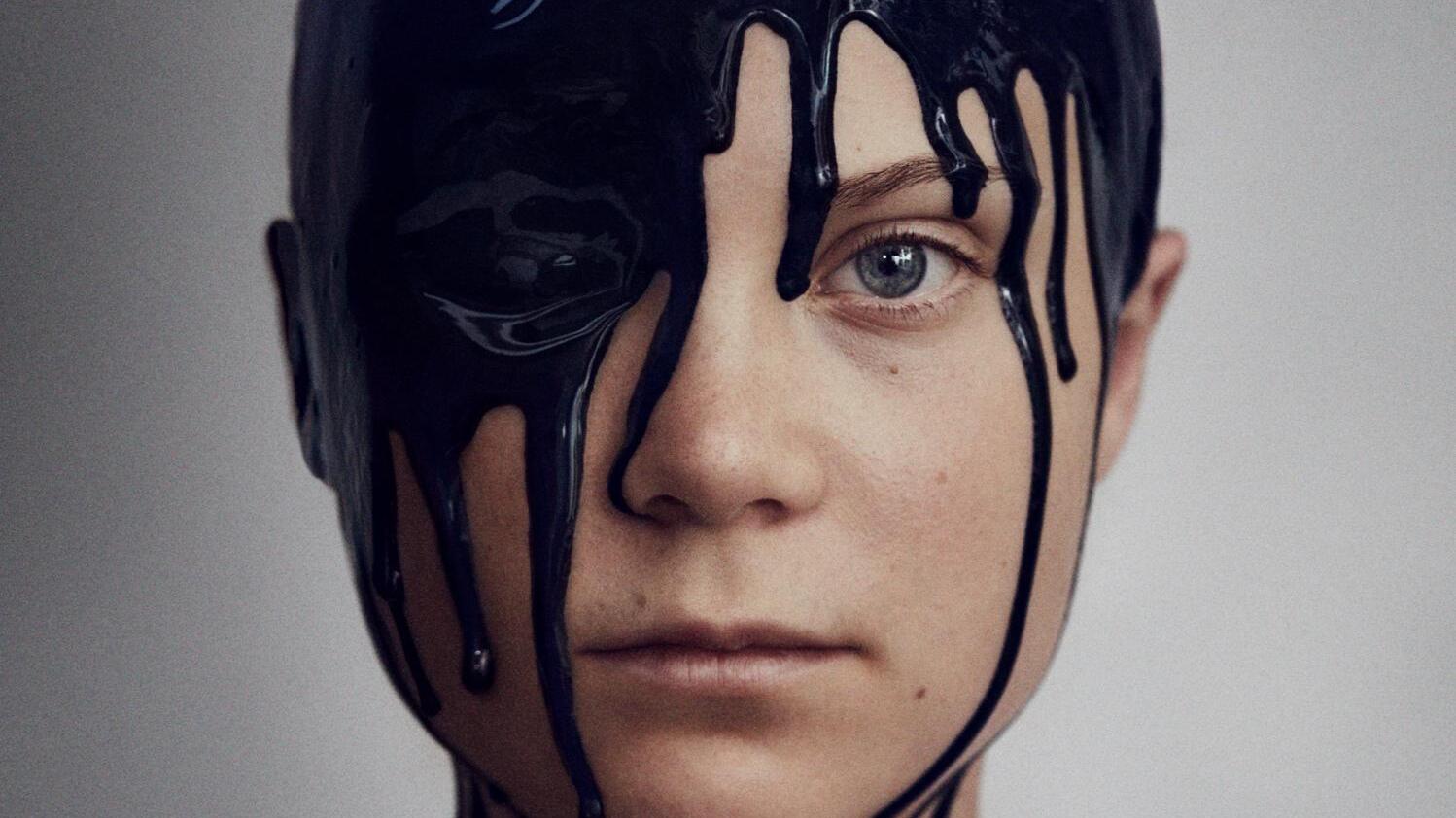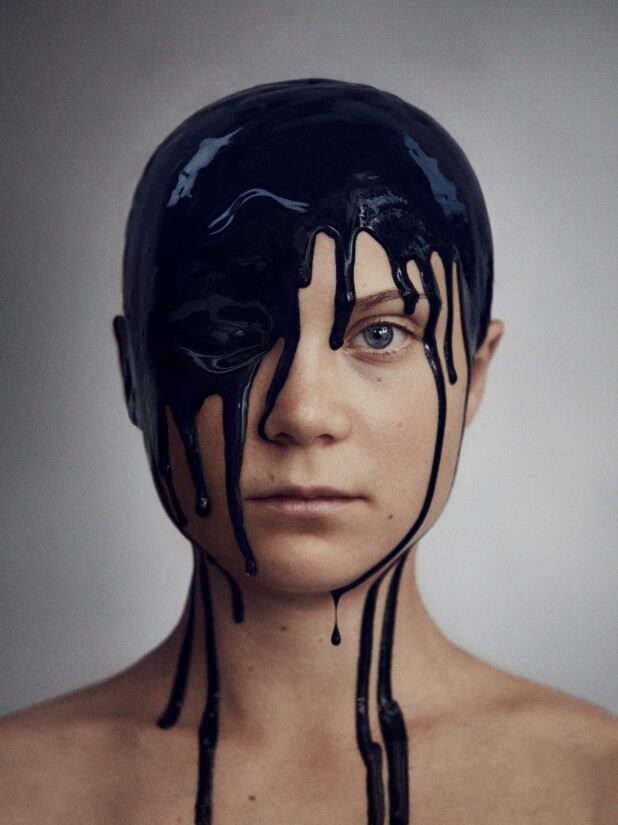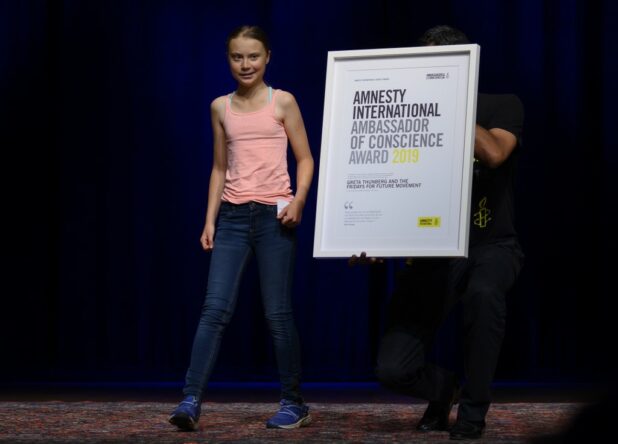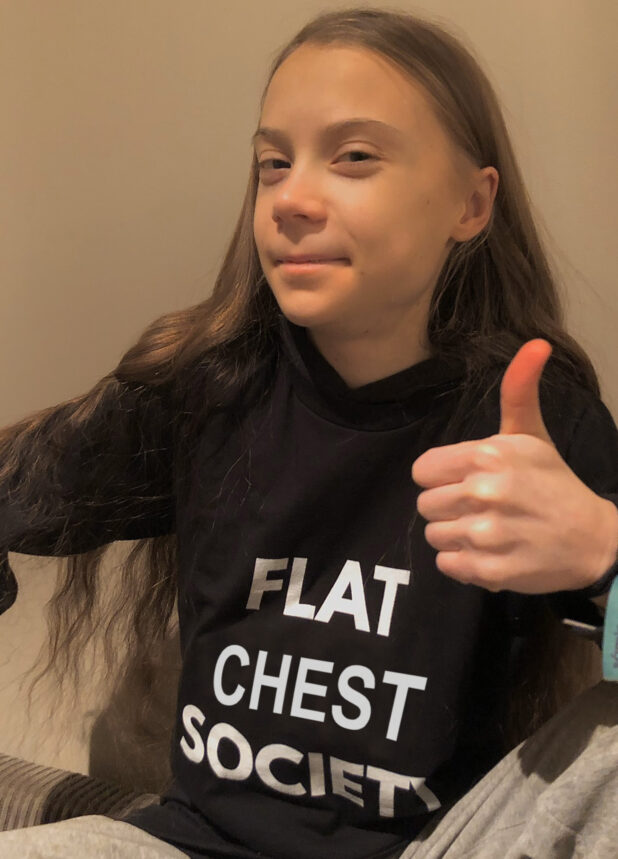The Guardian asked Greta to cover herself in fake oil and take pictures, but it is not clear if doing the one-eye thing was her idea.
On Saturday, The Guardian published an interview with Greta Thunberg and her family, where Greta reveals that the climate activists are mostly autistic kids suffering from depression, and her father, Svante, reveals that Greta’s mother was a pro-refugees activist who invited migrants to live with them in their home.
Both Greta and her only sibling have developmental problems, so there’s a possibility they may have been abused by some of those “refugees” Svante and his wife housed.
Greta Thunberg has made the ultimate sacrifice for the Guardian. She’s allowed us to turn her into a human oil spillage. The treacly black stuff is dripping from her hair, down her nose, past her cheeks on to her neck and shoulders.
Down, down, down it drips. By the time we speak on Zoom, a day later, she has just about got herself cleaned up. Has she ever been covered in oil before? (It’s actually a mixture of non-toxic finger paint and olive oil.) “No,” she says. This is a typical Thunberg answer – short, factual, to the point. She never likes to waste her words. How did it feel? “It felt better than I thought it would feel. I had a ribbon on my hair to not get my hair black, but then it spilt through the ribbon so my hair was completely black. It was very difficult to get off.” I suggest that she sues the Guardian. “Yes,” she says. Thunberg isn’t smiling.
We talk first thing on a Sunday. Look at Thunberg and she seems little changed – still elfin-like and earnest; still quoting the climate science with fastidious politeness; and still with that curious mix of pessimism (we’re doomed if we don’t act) and optimism (we can avert catastrophe if we do). But, as she relaxes, I begin to discover that this is a very different Thunberg from the one she presented to the public in 2018. While she has done much to change our perspective of the world, the world has done much to change her – and, she says, for the better. Despite the climate crisis deepening by the day, Greta Thunberg has learned how to be happy.
Like the rest of us she has retreated from the world over the past year and a half, but she has used her time to good effect – to grow up. Thunberg is now 18 years old and campaigning as ferociously as ever, while living in her own apartment (where she is speaking from), hanging out with friends and having fun. She is turning into the kind of young woman that neither she nor her parents could have ever envisaged.
Perhaps the biggest change in Thunberg is her faith in people. When she started out, she didn’t have any. “I didn’t think young people cared about climate because all the young people I knew were like, ‘Oh yeah, the climate is important, but I don’t want to do anything about it.’ But it turned out many young people around the world actually care. A lot! And they are very ready to do something about it. I’m very glad I was proven wrong.”
…
At the age of 11 she fell into a deep depression and stopped eating and talking. Why does she think she was so unhappy? “One of the reasons was I couldn’t wrap my head around the fact that people didn’t seem to care about anything, that everyone just cared about themselves rather than everything that was happening with the world. And being an oversensitive child with autism, it was definitely something I thought about a lot, and it made me sad.” Was it also because she had been bullied at school? “Yeah, to some extent.”
I ask if she literally stopped talking. “I spoke to my parents, my sister and a bit to my teacher,” she says. Why did she stop? “I don’t know. I just couldn’t.”
Svante tells me it was terrifying. “It was complete hell; a nightmare for me and my wife. We took all the time in the world to be with her and sort this out, and that was the best thing we’ve done in our lives.”
Svante and the opera singer Malena Ernman have two children: Greta and her sister, Beata, who is three years younger. When Greta was born, Malena’s career was taking off, so Svante – who had trained as an actor – stayed at home to look after the children. By the time they started school, Malena was touring internationally. Svante started a production company and looked after her work. But when Greta fell ill, he became a stay-at-home dad again, monitoring everything she ate (“Five pieces of gnocchi in two hours”) and her dramatic weight loss, and talking her through her fears. That was when he discovered that so much of it was rooted in the climate crisis.
It amuses him when he reads that it was he and Malena who turned her into a climate activist. Svante says that Malena was an activist but she campaigned for refugees (and they had refugees living with them) rather than the environment. The only aspiration he had for Greta back then was for her to get better. As for himself, he knew little about the climate crisis, wasn’t convinced by what he did know and just wanted to get a nice big car – an SUV or pick-up truck. Over time, Greta changed his mind.
…
At the time, Beata had also been diagnosed with neurodevelopmental disorders, and the family was imploding. Malena and Svante wrote a book about this period, with the Bergmanesque title Scenes from the Heart. It was published on 23 August 2018, three days after Greta’s first school strike. Svante says the timing couldn’t have been worse. “It was a hell of a nuisance when she decided to do the strike because it left us in a tricky situation.” Why? “It was obvious everyone would say you’ve written this book and she’s going on school strike as a PR stunt. But she had made up her mind she was going on strike, so we thought the only thing we could do was give every cent away. All our earnings from the book went to charity.”
…
Thunberg was at home with her father for a year. By the time she was ready to return to school (initially a specialist autism school, then grammar school), she had been diagnosed with Asperger’s, obsessive compulsive disorder and selective mutism. Thunberg says the diagnosis came as a relief. “When I felt the most sad, I didn’t know that I had autism. I just thought, I don’t want to be like this. The diagnosis was almost only positive for me. It helped me get the support I needed and made me understand why I was like this.”
…
Thunberg says she has met like-minded people – in every way. “In the Fridays for Future movement, so many people are like me. Many have autism, and they are very inclusive and welcoming.” She believes the reason that so many autistic people have become climate activists is because they cannot avert their gaze – they have a compulsion to tell the truth as they see it. “I know lots of people who have been depressed, and then they have joined the climate movement or Fridays for Future and have found a purpose in life and found friendship and a community that they are welcome in.” So the best thing that has come out of your activism has been friendship? “Yes,” she says. And now there is no mistaking her smile. “Definitely. I am very happy now.”
We’re seeing a lot of “retard pride” these days, which is something I don’t think anyone should be happy about.




